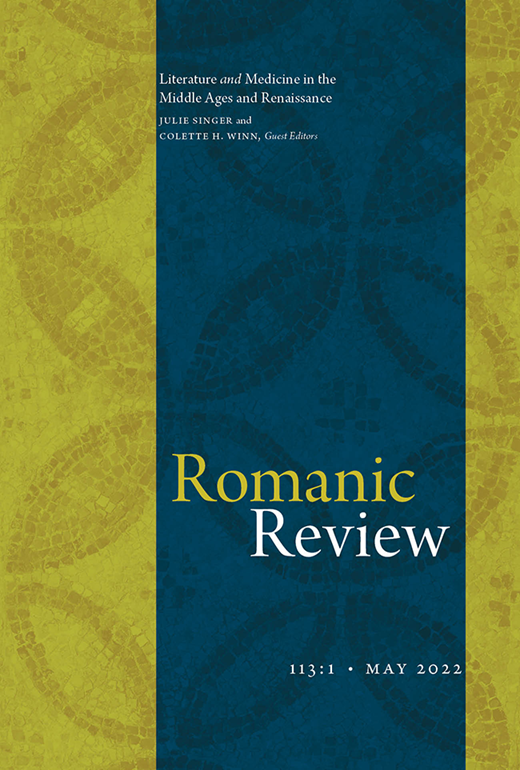
Romanic Review, Vol. 113, Issue 1 : "Literature and Medicine in the Middle Ages and Renaissance"
Romanic Review, Vol. 113, Issue 1
Literature and Medicine in the Middle Ages and Renaissance
Guest editors : Julie Singer, Colette H. Winn
Recent scholarship on medicine and literature has yielded new understandings of the intermingling of medical and literary discourses, and particularly of the ways that medical concepts, metaphors, and thematics can function within literary texts. However, despite the considerable body of work that has built up since George Rousseau’s seminal 1981 “state of the field” article, “the ‘and’ problem”—the question of what sort of relationship the and in literature and medicine denotes—persists (Jordanova 342). As the bioethicist Catherine Belling has pointed out, it is far from transparent what “‘literature and medicine’ mean[s], and to whom” (vii).
New work on literature and medicine, including scholarship undertaken through increasingly prominent approaches such as medical humanities and disability studies, promises to continue working through the “and” problem. Although it has been argued that the logical underpinnings of medical humanities and of disability studies are mutually exclusive (Herndl 593), the category of medical humanities is becoming ever more inclusive of disability studies approaches (Dolan 1). Both disability studies and medical humanities, though, like the greater field of “literature and medicine,” have been largely focused on modern, biomedicalized culture (Squier 335). While such a presentist focus has made sense within the field of medical humanities—which was developed as a part of the training of today’s physicians—this almost exclusive concentration on the modern developed world has brought with it many unexamined presumptions about genre, narration, authority, and the boundaries of discipline.
Table of contents
Introduction: Literature and Medicine in the Middle Ages and Renaissance
Julie Singer; Colette H. Winn
Poetry and Poetics in Gilles of Corbeil and Gentile da Foligno’s Carmina de urinarum iudiciis
Maggie Fritz-Morkin
Béroalde de Verville, médecin conteur, et la seconde vie de la Querelle de l’Abstinente (1612)
Colette H. Winn
The Physician’s Species: Knowledge and Power in the Animal Clinic
Joseph R. Johnson
“Come vertute in petra prezïosa”: An Avicennian Thread in Guinizzelli’s Theory of Nobility
Matteo Pace
Dining with the Hermaphrodites: Courtly Excess and Dietary Manuals in Early Modern France
Kathleen Long
Julie Singer
Teresa de Cartagena’s Illness and Disability as Embodied Knowledge
Yonsoo Kim